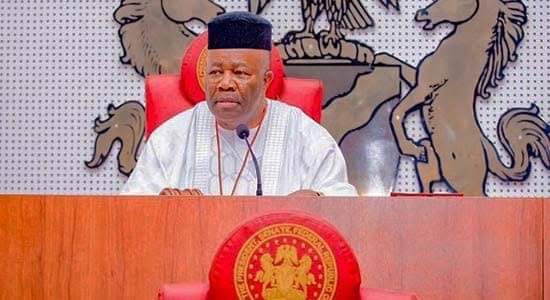Tinubu Makes U-turn Over 40% IGR Deduction From Tertiary Institutions
The Federal Government has finally bowed to pressure, thereby suspending the automatic deduction of 40 per cent from the Internally Generated Revenue, IGR, of tertiary institutions.
The reversal order was given by President Bola Tinubu on Friday.
Tinubu spoke at an ongoing 75th Founder’s Day ceremony of the University of Ibadan (UI).
He was represented by the Minister of Education, Tahir Mamman, as the Visitor to the University, describing the policy as ill-timed.
“The 40 per cent IGR automatic deduction policy stands cancelled. This is not the best time for such policy since our universities are struggling,” he declared.
Last week, it emerged that the government was set to begin implementing a 40 per cent automatic deduction from internally generated revenues of federal universities and other partially funded institutions.
The development is coming amid a crumbling economy and poor funding of the nation’s tertiary institutions, with stakeholders expressing concerns about the policy’s negative impact.
The leaked memo from the Revenue and Investment Department of the Office of the Accountant General of the Federation in the Federal Ministry of Finance notified the institutions of the government’s automatic deduction of 40 per cent of its IGR from November.
The letter dated 17 October with reference R&I/2045/T/252, and signed by the Director of Revenue and Investment Department, Felix Ogundairo, noted that the decision, which affects all partially funded government agencies and parastatals, including universities, was in line with the provisions of Section 62 of Finance Act 2020.
“It is important to emphasise that this policy of 40 per cent auto deduction of gross IGR is in line with the Finance Circular Reference Number FMFBNP/OTHERS/IGR/CRF/12/2021/ dated 20 December 2021, limiting the budgetary agencies or parastatals to not more than 50 per cent of their gross IGR and the remittance of 100 per cent of the remaining 50 per cent to the sub-recurrent account. While all statutory revenue lines like Tender fees, contractors’ registration fees, disposal of fixed assets, rent on quarters, etc., shall be remitted 100 per cent to sub-recurrent accounts,” the memo partly read.
Leading up to the new development, President Bola Tinubu had in June signed into law the bill to establish a Students Loan Fund (SLF) to provide interest-free loans to Nigerians seeking higher education.
As a follow-up, Nigeria’s federal government, in the 2023 supplemental budget, proposed the allocation of N5.5 billion for the education loan fund, which was later raised to N10 billion by the National Assembly. The appropriation bill has been passed and signed by the President.
However, some Nigerians claimed the student loan was being prepared as a ground for hiking tertiary institution fees; hence, some now think there is a connection between the two.
Reacting to the development, both the Academic Staff Union of Universities, ASUU, and its counterpart, the Colleges of Education Academic Staff Union, COEASU, have issued official statements asking the Federal Government to remove their institutions from the list of agencies expected to remit 40 per cent of their Internally Generated Revenue.
The Committee of Vice Chancellors of Nigerian Universities has also written a protest letter to the Federal Government, demanding that the government rescind the plan to deduct 40 per cent of the Internally Generated Revenues of federal universities.
The Secretary-General, Committee of Vice-Chancellors of Nigerian Universities, Professor Yakubu Ochefu, said the government could not demand 40 per cent of varsities IGR when it declined to grant them autonomy.
Ochefu noted that universities operate without surpluses, relying primarily on student fees rather than generating profits or revenues, and any enforced deduction would ultimately affect parents.
“If you look at the Act, it didn’t say 40% IGR, but a surplus. So, who determines what is surplus? The Finance Act of 2020 is explanatory, and it is the institution that is supposed to decide and send you the surplus if there is any. But FG says it now wants to deduct it from the source. We have protested and written to the Ministry of Education.
“If they insist, it means they want to ground the universities to a halt. Or we will be forced to add the 40 per cent to what we are charging the end users, and these end users are already complaining. We told the Ministry of Education to write the Ministry of Finance to halt the development. The letter was written on Thursday.
“Ultimately, any decision taken, it is the parents that will bear it. Schools are not commercial activities; they are social entities. Parents will bear it if FG insists on a 40 per cent deduction. For the government to sit down somewhere and equate universities, colleges, and polytechnics as revenue centres, that isn’t possible. They are not funding universities well enough. If you grant autonomy and we are charging the normal rate, then we will give you 40 per cent,” he said.
Shocked by the development, the Academic Staff Union of Universities, ASUU, which called on its members nationwide to prepare for an “indefinite strike” over the failure of the Nigerian government to honour the agreement it made with the union, condemned the directive, claiming it would further impoverish and emasculate the Nigeria University System.











































